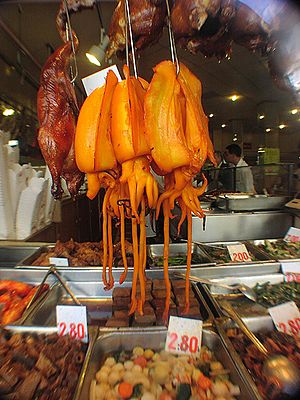Orange cuttlefish facts for kids
 |
|
| Alternative names | Orange squid |
|---|---|
| Place of origin | Guangdong or Chaozhou |
| Main ingredients | cuttlefish |
| Orange cuttlefish | |||||||||||||||
|---|---|---|---|---|---|---|---|---|---|---|---|---|---|---|---|
| Traditional Chinese | 鹵水墨魚 | ||||||||||||||
| Simplified Chinese | 卤水墨鱼 | ||||||||||||||
| Hanyu Pinyin | lúshuǐ mòyú | ||||||||||||||
| Cantonese Yale | lóuh séui mahk yù | ||||||||||||||
| Literal meaning | master-sauce stewed cuttlefish | ||||||||||||||
|
|||||||||||||||
Orange cuttlefish or orange squid is the most common English name used for the cuttlefish dish in Cantonese cuisine. It is a siu mei although it is not quite roasted. The dish is most commonly found in Southern China, Hong Kong and overseas Chinatowns.
Names
A cuttlefish or squid can be used interchangeably, though they both share the same Chinese food name (鹵水墨魚). It is also shortened most of the time to just (墨魚).
The word "orange" has been used to distinguish it by color. The fruit orange does not have anything to do with the dish.
Cantonese cuisine
The orange color comes from food coloring dye. Some flavors are added in order to enhance the taste of the cuttlefish. It has a unique soft-crisp (Chinese: 爽; Cantonese Yale: sóng) texture, generally not found in any other meat.
When served, it is usually sliced into tiny pieces. It comes with a black soy sauce-based dipping gravy called (Chinese: 鹵水; Cantonese Yale: lóuh séui) that gives it a mildly salty flavor. The sauce is culturally accepted to originate in Guangdong or Chaozhou cuisine.
See also
 In Spanish: Sepia naranja para niños
In Spanish: Sepia naranja para niños

